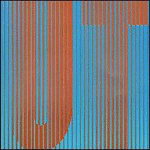|
|
 |
Dusted Reviews
Artist: Ut Album: In Gut's House / Griller Label: Blast First/Mute Review date: Nov. 19, 2006 |

|
|
|
 |
With all the relatively recent attention heaped on every shade and color of New York’s famed late 1970s No Wave scene, it’s strange that few saw fit to resurrect the work of Ut. A trio of women borne out of multi-instrumentalist Nina Canal’s post Dark Days work (a band she shared with DNA member Robin Crutchfield) Ut’s music served as an American analogue to the intoxicatingly discordant clamor that European icons like the Slits, the Au Pairs, and Kleenex/Liliput concocted on the other side of the Atlantic. Faced with indifference at home in Gotham City, Canal and her bandmates Jacqui Ham and Sally Young ditched the states for England, subsequently releasing a couple of great but generally ignored records on the mighty Blast First imprint before calling it a day in the late 1980s.
That Ut are barely mentioned within the same breath as bands like Mars and Teenage Jesus and the Jerks is surprising. Though some would cite their apparent humorlessness as a fundamental reason for this omission, the fact that their aesthetic bedfellows worldwide have been heralded as epoch defining musicians seems like it should have made them a lock for such attention in their home country. In an attempt to remedy that injustice, Mute has stepped forward with a reissue program aimed at giving these ladies the attention they deserved. Beginning with In Gut’s House and the Steve Albini-engineered Griller, their final two releases, Ut’s music has been dusted off and presented anew, allowing a more complete image of a band who managed to exist at several crucial junctures in punk music without ever fully breaking through.
In Gut’s House first appeared in 1988, at a time when the trade winds had distinctly shifted away from post-punk’s rhythmic dissonance. Swapping instruments with reckless abandon, here the band uses a mix of guitars, bass, violin, and drums to affect a deliriously bent form of aggression. Using percussion as a counterpoint instead of a rhythmic lead, the band lurches and stutters, with members taking turns on each successive instrument. The sounds here come in crescendo’d spurts, with the strings of tracks like “Evangelist” and “Swallow” alternating between pure evisceration and gentle leads, providing a suitable vehicle for Ham’s harrowing vocal stabs and Canal’s almost intuitive drum work. “Homebled” and “Shut Fog,” on the other hand, find Canal and Ham trading off screeching violin lines against guitars that wouldn’t sound out of place on early Sonny Sharrock or James Blood Ulmer records. More than anything, “Mosquito Botticelli” best summarizes the band’s approach on this album – harmonica notes escape in the distance over an off-beat tribal thump, with producer Paul Kendall’s vocal manipulations creating unsettling pulses of wrenched larynxes that rise above the instruments’ dirty clamor.
Hooking up with Steve Albini for 1989s Griller gave the band a more visceral punch – the bass gets a more muscular tone, the guitars sound like they could strip paint, and the drums thump with an authoritative purpose. With the percussive chair mostly handed over to newcomer Charlie D., Ut bordered on a bizarre form of outright accessibility here. While Charlie’s drums can pound with an almost leaden weight, he provides a previously unheard backbone for tracks like the propulsive “Canker” and “Fuel,” lending urgency to the chiming guitars and Young’s familiar yelps. The tense “Posse Necks” reaps a similar benefit, with a forlorn violin fighting against a six-string onslaught as Ham’s vocals negotiate grim territory. More often than not, though, those moments when the band returns to their traditional trio configuration sound the best – for “Spore,” Canal’s vocals careen around a dual guitar attack that Ham’s drums bisect, while album opener “Safe Burning” spotlights the playfully aggressive interplay the band had spent 10 years honing.
After Griller settled, Ut called it quits. Theirs was a music that always explored the darker implications of No Wave textures, never once ceding to the hooks or ham-fisted funk that invalidated the later work of many of their contemporaries. Ut never made a real attempt to engage with larger music structures and scenes in which they found themselves, and while this dedication to a decidedly inward aesthetic has subsequently marked their recordings as uniquely original, it has also unfortunately meant that they sound out of place when stacked against many of the bands that existed around the time they did. Not that that’s necessarily a bad thing – the records these three coughed up during their run sound tied to neither date nor place, evidencing three musicians with a singular vision that could never easily be pinned. At the same time, however, it throws into sharp relief the reasons why they have been largely forgotten. As a band that couldn’t easily be pigeonholed, Ut suffered the fate of general indifference. A shame, that is – these records sound even more invigorating today when compared against a sea of No Wave fakes whose only desire so far has been to replicate a long-lost zeitgeist they never fully understood.
By Michael Crumsho
|







